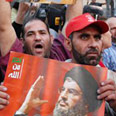
Israel's quiet victory
Radical Islam increasingly perceived as strategic threat to West
In the conflict between Israel and its opponents, the terror groups, there's no doubting the other side's talent and ability to fully utilize its advantage in the media, where the stronger party is the weak one.
In that battle, all means are kosher: threatening journalists, doctoring photos, "planting" dolls and wedding gowns at bombing sites, staging scenes featuring the evacuation of "wounded," and a plethora of other creative manipulations.
Indeed, international media buys into everything.
The problematic starting point Israel's public relations efforts must contend with, as we learn from international public opinion surveys, is the mental infrastructure of the Western-European news consumer, with Israel perceived as an aggressive, uninhibited attacker that is almost as fanatical and radical as its opponents across the border.
The foreign press presence in Israel also holds on to this perception. We want them to view the conflict through Israel's eyes, while they are able to view Israel only through the lenses of the conflict.
An example of this is the Israeli spokespeople during the war. One of the myths associated with Israeli public relations efforts for generations is the centrality of the speakers: If only we find someone like Abba Eben or Benjamin Netanyahu, Israel would be able to win the battle over media coverage and public opinion.
Contending with images of Beirut
During the month of war, this myth fully collapsed: The State of Israel deployed coherent men and women featuring clear messages and boosted by the Israeli consensus who submitted to hundreds of interviews on dozens of TV channels.
In CNN alone, Israeli government spokespeople submitted to 400 minutes of interviews in the first two weeks of the war, constituting about 10 percent of the total airtime dedicated to the war.
On the other hand, Arab spokespeople were only interviewed for 30 minutes. Did the fact that Israeli spokespeople received so much more airtime than their opponents decide the outcome of the media war? The answer is negative. After all, the Israelis were not required to contend with their Arab colleagues, but rather, with the images of destruction and victims from Beirut.
And where were images of the suffering, hurting Israeli home front taken by dozens of foreign media crews operating from media centers set up by the Foreign Ministry in Haifa and the upper Galilee? They were cut due to editing considerations because they failed to match the narrative presented.
All of the above is in plain view of the Israeli news consumer, but the most important things are hidden from view. The dust left behind by the military campaign along with the heavy price of those killed and kidnapped, the media fog and the waves of criticism, all combine to hide a fundamental Israeli achievement:
The decline of the narrative that argues that the Israeli-Palestinian conflict, and particularly the equation of Goliath (us) against David (them), are the exclusive reason for Middle Eastern instability.
For three decades now, Israel has been facing a Palestinian-Israeli media arena it did not choose, but finds it difficult to extract itself from. The battle over image staged against the Palestinians caused Israel heavy damages in the eyes of Western public opinion, undermined its perceived moral standing, and reinforced its image as aggressive and inhumane.
Despite this, leaders and spokespeople found it difficult over the years to formulate an alternative narrative and focused on attempts to present Palestinian injustices in the face of our humanity – but to no avail.
Coalition of radicals
In the wake of the recent war, a new reality is emerging – one that allows Israel and its representatives to work for changing the media narrative and creating a new arena. We aspire that this new framework will be used by Western media and public opinion to view, translate, and judge events in the Middle East.
Public opinion surveys commissioned by the Foreign Ministry in recent weeks in the United States and leading European countries showed the maturity of the public's understanding of our new regional reality.
Indeed, the surveys showed wide identification of the two coalitions – the moderate one, which includes Egypt, Jordan, Palestinian leader Abbas and Lebanese PM Siniora, vis-à-vis the radical coalition of Iran, Syria, Hizbullah, Hamas, and al-Qaeda too.
In the wake of the war, radical Islam is increasingly perceived as a strategic threat on the West that is not merely a reaction to the Israeli-Palestinian conflict. This is a new reality that is comfortable for Israel.
The changing narrative is not absolute or irreversible. European public opinion will find it difficult for a long time to come to view Israel as moderate, while international media will continue to present developments in the Middle East through a filter that reinforces Israel's image as a country that resorts to disproportional force at any given situation.
However, this does not change the fact that something has changed: The West's perception of reality, including its leaders and public opinion, is increasingly getting closer to the Israeli view.
The Israeli public relations system (an experienced punching bag, we must say), was able to identify the trend, adapt its messages accordingly, create a uniform line used by its spokespeople, and effectively utilize Israeli representatives and sympathizers online and among varied target audiences.
All of the above made a decisive contribution to the maturing of the new global perception. In the long run, this is an achievement for the State of Israel that may be quiet and hidden from view, but possess strategic importance.
Amir Reshef-Gissin heads the Foreign Ministry's Public Affairs Department










